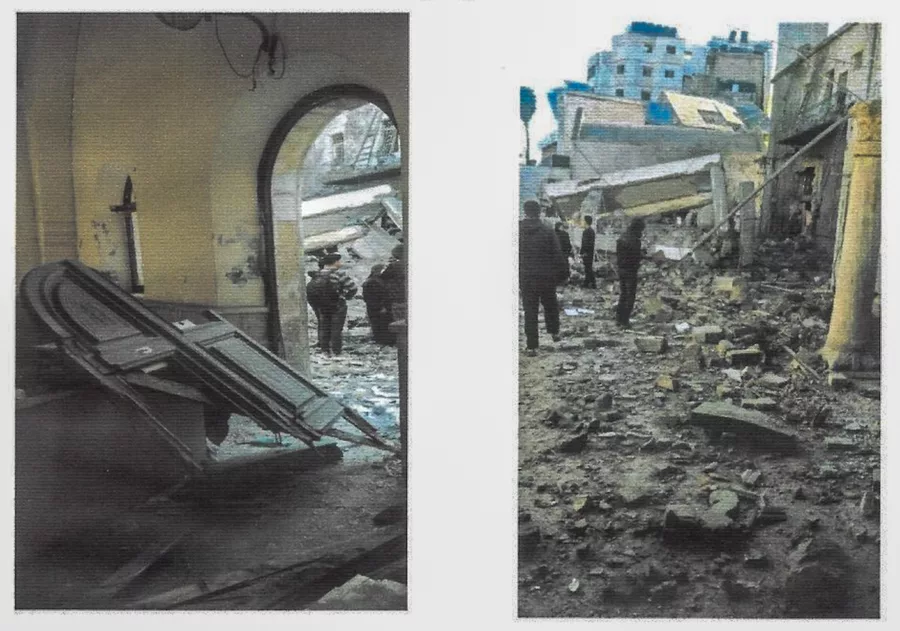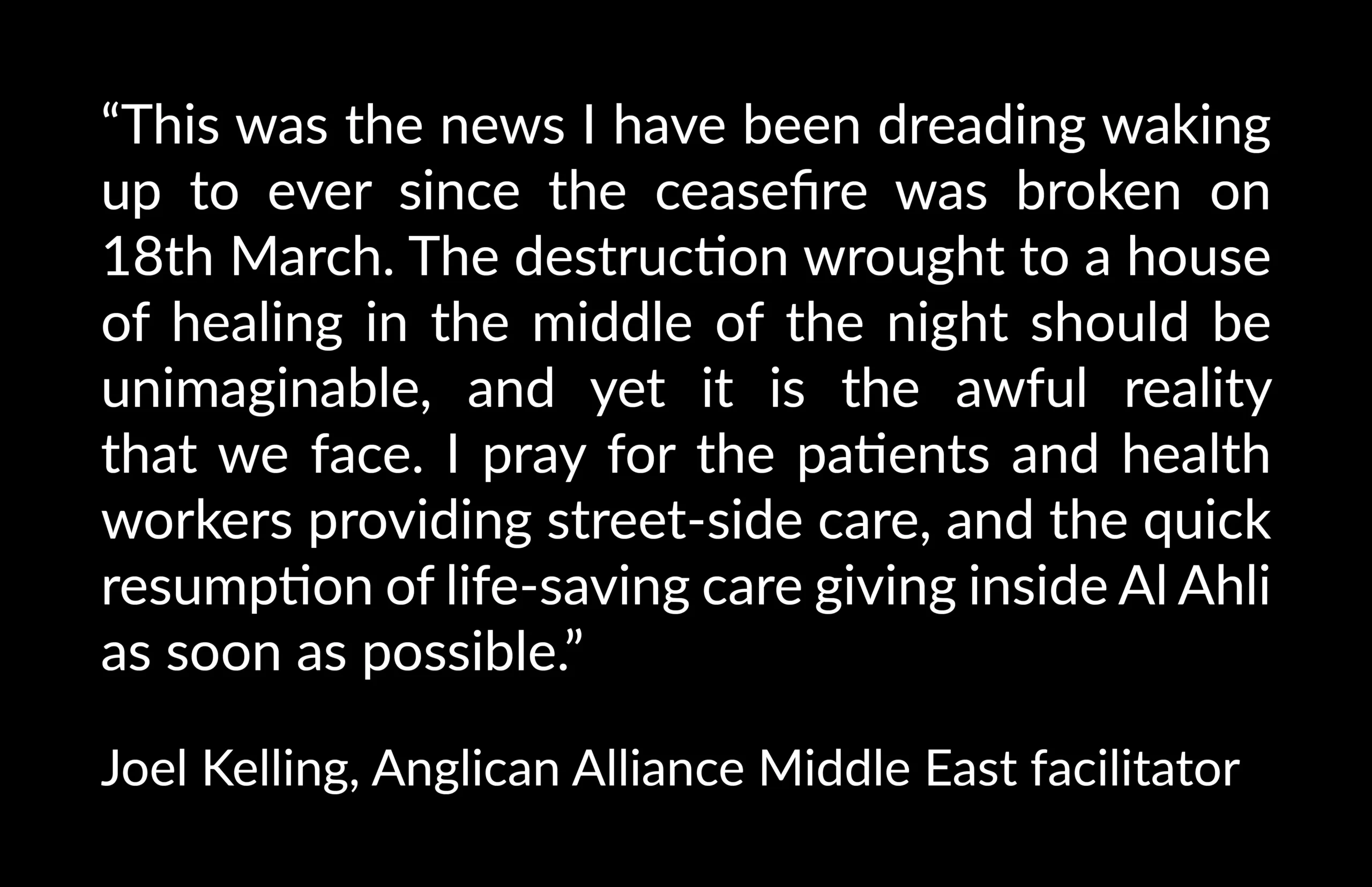“Our dedicated staff is working diligently to restore the affected areas and ensure the uninterrupted delivery of critical medical care… [They] are highly capable of handling all kinds of emergencies and have successfully saved thousands of lives during times of attack… We are truly blessed to have such dedicated and resilient staff, who continue to meet these challenges with unwavering commitment and compassion… We must continue to urgently advocate for immediate access to humanitarian aid.” Sawsan Aranki-Batato, Programs Development Officer, Episcopal Diocese of Jerusalem & the Middle East.
We are devastated and outraged by the Israeli air strikes against the Anglican Al Ahli Arab Hospital in Gaza City on Palm Sunday. We lament this destructive act against a place of healing and continue to pray for a real and lasting peace with justice for Palestinians and Israelis.
What happened
In the early hours of Palm Sunday, the Israeli Defence Force carried out airstrikes against the Anglican Al Ahli Hospital in Gaza City.
The twin strikes demolished the new two-storey Genetic Laboratory and damaged the Emergency Department and Pharmacy buildings (though thankfully not the medicines and medical supplies store). There was collateral damage to surrounding buildings including the chapel, which also served as a ward for 20 patients.

Inside and outside St Philip’s Church (the chapel) at Al Ahli hospital, following the Palm Sunday bombing. Photo: Diocese of Jerusalem.
Al Ahli Hospital is the only hospital still operating in Gaza City, having withstood over 17 months of war while continuing to provide critical medical care. It remains the sole facility equipped with essential medical infrastructure, including a CT scanner and a functioning operating theatre.
A warning was issued by the Israeli army twenty minutes before the bombing, ordering the evacuation of all patients, employees, and displaced people sheltering in the hospital compound. Whilst there were no injuries or deaths as a result of the bombing, a child with a previous head-injury died as a result of the rushed evacuation process.
The attack comes after six weeks of no medical aid or food being allowed into the besieged Gaza Strip.
Hearing from people on the ground
The Anglican Alliance’s former executive director, Rachel Carnegie, is currently in Jerusalem and spoke to Sawsan Aranki-Batato, the Programs Development Officer of The Episcopal Diocese of Jerusalem & the Middle East. Sawsan manages the joint emergency humanitarian support project funded by Anglican and other ecumenical partners* and co-ordinated by the Anglican Alliance, which has provided support to diocesan institutions in Gaza and the West Bank following the outbreak of war. Al Ahli Hospital has been a key focus of the project, with funds covering the medical costs of thousands of in- and out-patients.
Sawsan says, “Despite the destruction, we are fortunate to continue operations as our core services remain intact. Our dedicated staff is working diligently to restore the affected areas and ensure the uninterrupted delivery of critical medical care – now more vital than ever, as we strive to fill the gap left by other disrupted healthcare providers. We anticipate a steady rise in the number of patients due to the ongoing incursions.
“Our staff are experienced in operating under pressure and are highly capable of handling all kinds of emergencies. They have successfully saved thousands of lives during times of attack. They have utilized – and will continue to utilize – all available spaces in the hospital, including the corridors and the church. We are truly blessed to have such dedicated staff, and we are continually inspired by their courage and commitment.
“We must continue to urgently advocate for immediate access to humanitarian aid. For nearly four weeks, the people of Gaza have received none – leaving them without food, clean water, and basic necessities. Poor hygiene conditions and overcrowded shelters have significantly accelerated the spread of infectious diseases. Patients with chronic conditions are now experiencing serious complications due to the lack of timely access to medications. As a result, our staff are managing an increasing number of patients suffering from a wide range of illnesses.
“We are truly blessed to have such dedicated and resilient staff, who continue to meet these challenges with unwavering commitment and compassion.”
Rachel Carnegie adds, “My heart breaks for the situation – but it is also so inspiring to see how, as ever, the hospital staff, with support from Sawsan and others, are responding to continue to save lives”.
Suhaila Tarazi, director of Al Ahli Arab Hospital, writes, “Thank you for your heartfelt messages and unwavering support during this challenging time… Despite the destruction, our dedicated team is working tirelessly to restore essential services and continue providing care to the community.
“In the name of our Lord Jesus Christ, Al-Ahli remains a vital lifeline for Gaza City and the northern region, and we are committed to maintaining our operations to the best of our abilities.
“Your solidarity, prayers, heartfelt thoughts and kind words are a source of strength for all of us here. We deeply appreciate your concern and support.”
On Sunday morning, the Diocese of Jerusalem issued a response to the attack. The full statement can be found here. It concludes, “The Diocese of Jerusalem is appalled at the bombing of the hospital now for the fifth time since the beginning of the war in 2023-and this time on the morning of Palm Sunday and the beginning of Holy Week. We call upon all governments and people of goodwill to intervene to stop all kinds of attacks on medical and humanitarian institutions. We pray and call for the end of this horrific war and the suffering of so many.”
Prayer requests
Sawsan asks that we continue to pray for:
- an immediate ceasefire
- protection of health facilities
- protection of patients and health staff
- unconditional supply of humanitarian aid.
Other responses to the bombing
Joel Kelling, the Anglican Alliance’s facilitator for the Middle East writes, “This was the news I have been dreading waking up to ever since the ceasefire was broken on 18th March. The destruction wrought to a house of healing in the middle of the night should be unimaginable, and yet it is the awful reality that we face. I pray for the patients and health workers providing street-side care, and the quick resumption of life-saving care giving inside Al Ahli as soon as possible”.
A statement from Archbishop of York Stephen Cottrell reads:
“The Anglican-run Ahli Hospital in Gaza is a place of healing and care for Palestinians living through unimaginable suffering. In unbearable conditions, its heroic doctors and nurses have cared for civilians who have endured 18 months of devastating violence.
“For the only Christian hospital in Gaza to be attacked on Palm Sunday is especially appalling. I share in the grief of our Palestinian brothers and sisters in the Diocese of Jerusalem. I pray for the staff and patients of the hospital, and for the family of the boy who tragically died during the evacuation.
“At the start of Holy Week, I join the cries of Christians around the world for an end to this violence – and for justice, security, dignity and peace for Palestinians and Israelis.”
Presiding Bishop of The Episcopal Church Sean Rowe wrote the following to Episcopalians in the USA. Full statement here.
“No matter how we understand the causes of violence in the Holy Land, we can surely agree that we must support our fellow Anglicans in alleviating the devastating humanitarian crisis now unfolding in Gaza.
“During these sacred days, as you encounter the suffering and sacrifice of our Redeemer and come again to the joy of the Resurrection, please pray for all of the people of the land where Jesus lived, died, and rose again. May God grant them a future free of violence and suffering.”
*Funding partners: Episcopal Relief & Development, USA; Anglican Missions Aotearoa, New Zealand, Polynesia; Tearfund New Zealand to be sent through Anglican Missions; Anglican Board of Mission / Anglicans in Development Australia; Anglican Overseas Aid, Australia; Mosaic Middle East; Tearfund UK; Alongside Hope (formerly PWRDF), Canada.
Additional supporters of the diocese include the American Friends of the Episcopal Diocese of Jerusalem, Embrace the Middle East, Friends of the Holy Land, USPG.
Please visit these agencies’ websites if you would like to make a donation.

